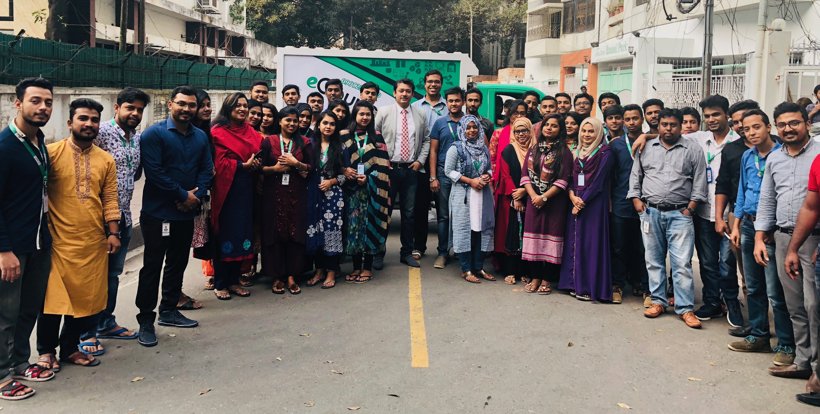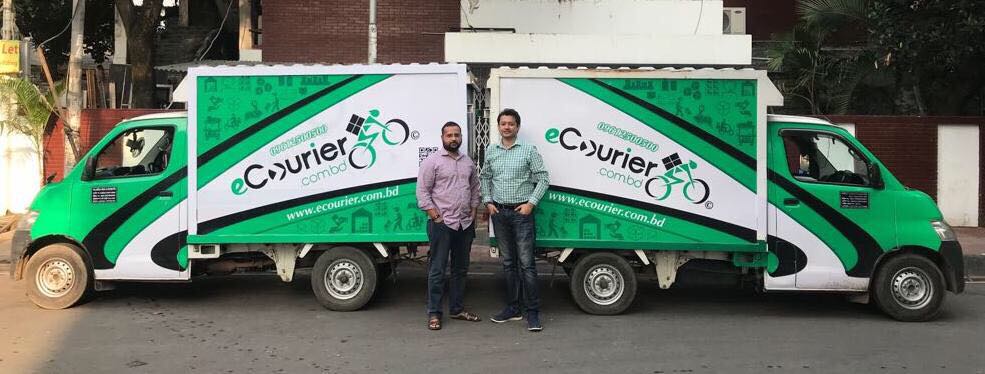
In 2014, Biplob G Rahul and his company were working on an automation software project for a local logistics company. It was before the current ecommerce boom in the country. It was an interesting project. But not all interesting projects end well. The project fell apart in the middle because that logistics company rendered it unimportant.
Although it was pretty early days, ecommerce was already showing the sign of promise. Biplob and his team noticed the movement in the market. So instead of killing the project, Biplob decided to turn it into a logistics company. eCourier, an ecommerce focused logistics startup, was born. It grew quite fast.
eCourier had its advantages. The market was a green field. Biplob had (still has it) his call center business before eCourier called Soft Call serving ecommerce companies at that time. It made the entry to the market easy. It was selling one more service, a necessary one in that, to the same customers of logistics business. First two years, eCourier did great serving hundreds of customers.
The market also grew with more ecommerce players entering the market and an increasing number of people shopping online. New logistics companies entered the market to serve a growing ecommerce industry between 2015 and 2016. A rather unwitting competition ensued.
“We became relatively silent in terms of hunting customers aggressively and fighting the price war that started towards the end of 2016,” says Biplob G Rahul. “Instead we focused on building the business, establishing processes in the company and serving our existing customers well. We stayed out of the price war.”
eCourier also made some mistakes during its heydays between 2014 and 2016. These are the mistakes that many fast-growing startups make. Prioritizing revenue over the process. Taking customer service for granted. Faltering in customer experience. “We made some mistakes when handling the responsibilities our customers bestowed upon us. At one point, we were overbooked. We took orders beyond our capacity to deliver.” The result was a lot of disappointed customers.
The new market reality and its own challenges forced eCourier to take a hard look into its own operation and reflect. “We took entire 2017 to rebuild ourselves,” says Biplob.
During this period, however, eCourier continued its growth journey but largely focused on building its internal organizational strength. It has invested in building a winning culture. In developing process and system to ensure better customer service. It has expanded its large item delivery business it calls LPU - increased the number of the delivery van to 12. It has entered into the fulfillment business. Expanded its coverage through franchisee and booking agent model. These are interesting developments.
Logistics is an important space. It has been seeing consistent growth. The competition in the logistics space has also grown in the past few years. New players like Pathao, Paperfly, Biddyut and a host of others have entered the market. More recently ride-hailing player like Shohoz has also entered the market. In the coming years, competition is likely to get tougher. As the opportunity grows in the space, more serious players are likely to enter the market. How eCourier plans to fend off competition? Can it pull off? At the same time, how big is the current market for ecommerce delivery in the country?
We set out to find out answers to these questions in our recent conversation with Biplob G Rahul to learn what’s going on at one of the earliest ecommerce logistics company in the country. This is our second interview with Mr. Biplob. He has a fascinating perspective on the industry. I hope you enjoy the interview as much as we did.
Future Startup
It has been a while since we last spoke, how much has the eCourier changed? What are some significant developments?
Biplob G Rahul
Towards the end of 2016, we decided to pay more attention to building our internal organizational strength. We deliberately decided to take a break from promotion and attending community events and so on. We solely focused on the important aspects of our business. There were reasons behind it. Until 2016, we have done great business. Towards the end of 2016, we saw a sudden influx in the number of logistics companies in the market. Competition is good for any business. But what was happening in the logistics space was an unscrupulous price war. Many new entrants were cutting price without properly understanding the impact. Many were doing rate beating.
We knew that if they do it, they would not be able to maintain the cost. We never played that game. We decided not to participate in that game and instead focus on our business and serving our clients.
We already had a good client base. We paid attention to that. This period of focus work on building our business has helped us tremendously. While many new logistics companies struggled, our business thrived. In January this year, we grew to a point where we could not accommodate everyone in our old office and we shifted to this new place. In the meantime, we have changed our business significantly.
Future Startup
Could you please give us an overview of eCourier business today such as how many deliveries you do daily, your team, size of your operation and so on?
Biplob G Rahul
We are a team 42 including distribution people. We are fulfilling about 3500 deliveries per day on our SPU category, which stands for small product unit and about 400 on the LPU, large product unit. These are very different business and work differently. Pricing is different for each business. We have about 7500 registered customers. Of them, 2200 are active and work with us on a regular basis. The number has been growing consistently.
We have 4 warehouses in Dhaka and one in Chittagong. In Dhaka, we have 7 hubs. We have offices in Chittagong, Comilla, and Barisal. Other areas are managed by our franchise partners.
We have separated our large item delivery business which we now call LPU, as I mentioned earlier. There we deal with large products such as TV, refrigerator and so on.
We have 12 vans that are delivering products all the time. The segment has grown significantly over the last year. When we spoke in 2016, we had only one van.
We have launched a few other products. We now do seller pickup for the marketplaces as well. We pick from the merchants' place, do the packaging and deliver it to the customer. Ajkerdeal or merchant even don't handle the product.
Future Startup
You have launched a fulfillment business early this year, how is it doing?
Biplob
Yes. We now have a growing fulfillment business where are offering warehousing facilities to a host of big and small ecommerce companies and marketplaces in the country.
We have about 60 clients in fulfillment. Our people work in two shifts, day and night, in the fulfillment to ensure great service to our customers. Our plan is to turn fulfillment into an independent business unit.
We have been investing in automating our fulfillment centers. We are currently working on a QR Code based sorting system, once we implement, it would significantly reduce the need of human involvement. The system has been in the making for while and is almost ready.
Future Startup
What are some major changes that have happened over the last one and a half year? How much has eCourier evolved as a company?
Biplob
Product-wise, we have completely changed our technology stack. We now offer a real-time tracking system to our customers.
We have introduced an OTP based confirmation system for delivery confirmation. When a product is delivered to a customer, an automatic SMS is sent to both the customer and the merchant. It is equivalent to the 'received signature' in the case of physical delivery. It has significantly improved customer experience and reduced friction.
We have an excellent team now. We have been investing consistently in our people and in improving employee satisfaction. We provide free lunch and evening snacks. If someone works on off days, he or she get extra benefits. We have developed strong HR systems, policies, and practices. Now we have KPIs, employee benefits and all the things that are important for making our people happy.
Just before two years ago, I was doing everything. I used to receive about 30 clients call per day. Today I receive almost none. It is very different now. Most of the execution happens without me. We have developed a process and it is working. We work with a third part company who manages our distribution people. These people are on our payroll but we don’t manage them directly. We take help from a third party company who hires them and manages them on our behalf. They specialize in it.
Our organizational strength has grown. The market reputation has also grown. If we want we can increase our delivery up to 10,000 but that's not what we are trying to do because that would not work because we don't have the systems and processes in place. We learned this hard way. In 2016, we had the capacity of delivering 1000 orders, but we created 2000 orders and made a lot of mistakes. We don't want to repeat that mistake. Our priority now is to build a process-oriented organization that we could scale without compromising customer experience.

Future Startup
You have launched a new SMS marketing service for your customers and also a guaranteed delivery service, could you please tell us more about these services?
Biplob
We have launched a new service called booster to offer free SMS marketing solution to our customers. We have integrated a separate panel into our client dashboard where they could import their user list and send SMS at no cost. This has solved a critical problem for many of our customers who can't afford to buy bulk SMS from telcos and get the masking service facility due to their small operation size. Now they could get it from us. They simply need to send us a request and we arrange the rest with the operators.
We have launched a new guaranteed service where we are offering guaranteed same day and next day delivery and if we fail we don't charge.
Future Startup
You mentioned 60% of eCommerce orders come from outside Dhaka but outside Dhaka delivery remains a challenge, what have you done to that end so far?
Biplob
You rightly pointed it out, rural delivery remains a challenge for the eCommerce industry in Bangladesh. We see it as an opportunity. We have paid special attention to building a solid infrastructure so that we could deliver across the country. We are doing deliveries in almost nationwide now.
We have been doing B2B logistics business for the past three years. We have got a good understanding of the logistics business. We have built a countrywide network. We have been closely working with A2i where we have about 1500 active entrepreneurs. Of 1500, we have selected 600 entrepreneurs. In 12 districts, these entrepreneurs look after our distribution business. Many of these entrepreneurs are working as our franchisees.
We are also offering booking agentship. For instance, someone has a shop doing flexiload and other small business, we are giving them an eCourier website panel and they could take orders for us using the panel. They get a commission for each booking. The incentive for the partners is pretty high there. We are sharing a good percentage of our revenue so that it makes sense for these entrepreneurs as well. We have created a separate panel for them where they could log in and book orders and see how much they have earned. This is one of the ways we are approaching rural expansion.

Future Startup
What are some lessons you have learned?
Biplob
In 2016, we put revenue over the process and it has cost us dearly. When you have a strong system and processes in place, achieving scale gets easier. Founders should spend a good amount of their time and effort in building a team and developing systems and process.
Initially, it seems unnecessary and you feel tempted to do more sales instead of building a team, but in the long run, it would put you ahead in the game. Whatever investment you make in building a great team and developing process is never a waste.
Future Startup
What are the goals for 2019?
Biplob
Priority-wise: 1) 10,000 deliveries per day 2) 10 regional offices 3) cover all the rural areas 4) create around 500 entrepreneurs as booking agents
Going forward, growing our guaranteed delivery to a significant level is a priority. We are paying a lot of effort into it. We will continue doing it.
We have been working on a B2C individual parcel delivery business for a while now. We are almost ready on that front and plan to launch it by next month. We have not served individual customers before. But we see a huge opportunity there. The market is relatively big.
We are aware that the challenges are different. We believe our years of logistics experience will come to use in the space. We plan to run it using the same operation. We would need to make some changes in terms of technology but our existing operation could do it.
We don't have a user app yet. We have a manager app. We will launch a user app as soon as we launch our B2C business which both our merchants and individual users can use.
We are working on renewing our brand identity and personality. Our agency has started working on it. We are working on our new website and plan to launch it shortly. Once we launch the new website, people would be able to track their products on the website.
Future Startup
Do you plan to raise money in the near future?
Biplob
Fundraising is not a priority for us now. Being said that, we will explore if we see there is a good match and if we get smart capital.
Future Startup
How big is the ecommerce delivery business in Dhaka now?
Biplob
The number of daily deliveries in the eCommerce space is about 30,000 and basket value is between BDT 800 and 1000. Of 30,000 deliveries outside Dhaka account for 60%. The number, however, is growing pretty fast.
